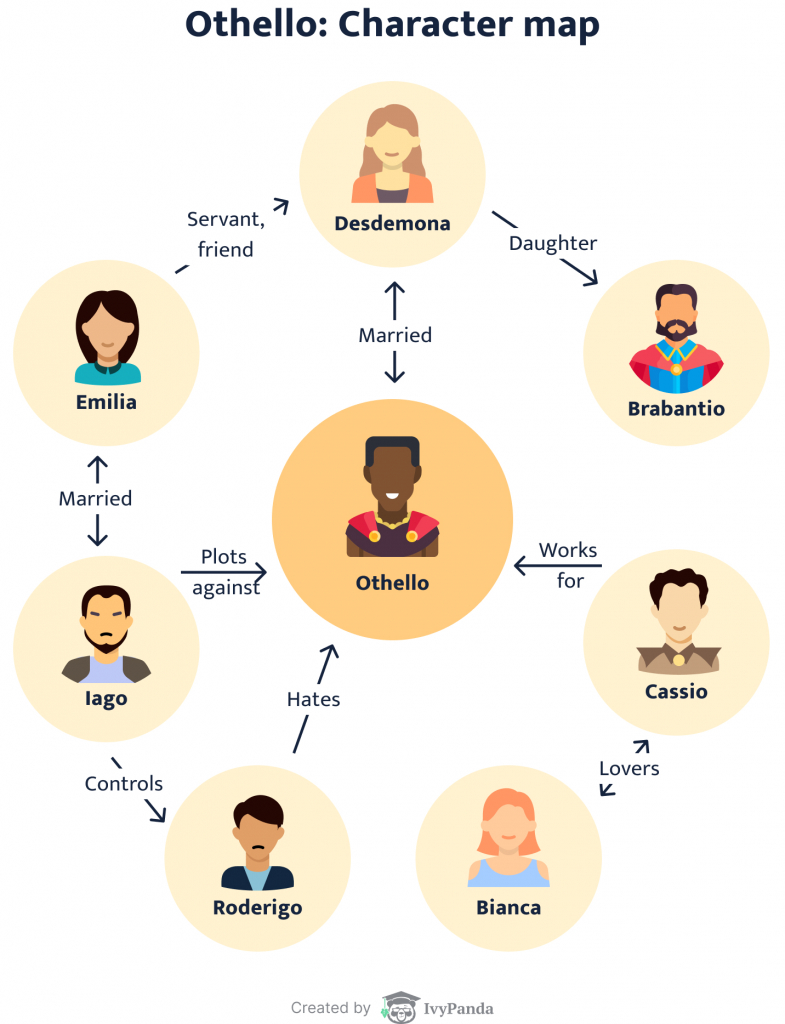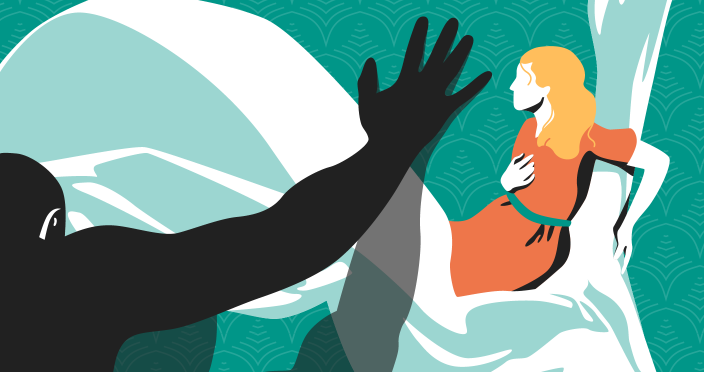Othello, one of the most famous Shakespearean plays, is widely known for its intricate portrayal of characters. Othello, Iago, Desdemona, Cassio, and other Othello characters represent complex emotions, struggles, and themes, such as trust, jealousy, loyalty, and resentment.
This article focuses on Othello character analysis. In it, you will find:
- Othello character map
- Description of major and minor characters with relevant quotes
- A detailed character sketch of Othello
- Other insights that will help you write a meaningful Othello character analysis essay
Let’s dive right in!
🧑🏾🤝🧑🏼 Othello: Character Map
The variety of Othello characters allows the conflict of the play to stay alive and for the events to develop gradually. Here, you can see all the crucial figures:

It is necessary to note that all of the characters in Othello are important. Yet, let’s start with the major ones.
👨🏿 Othello

The protagonist of the play. Othello is the general of the army of Venice, a Christian Moor who earned the respect of others. He is seen as a powerful, honest and straightforward figure. However, his age and race make him an easy target for the evil plots of his ensign Iago.
Othello Character Analysis
The general of the Venetian army, a Christian Moor, Desdemona’s husband – these are some of the parts of Othello’s description. However, these are only one side of the coin. The combination of Othello’s character traits makes him a complex hero.
He is a foreigner from Africa, different by race and culture. That makes his status more complicated. On the one hand, he is an experienced soldier who won the post of general by intelligence and excellence in the military. He is courageous, intelligent, and respected by his troops. However, on the other hand, he is a black Moor. His appearance is often described with such expressions as “the thick-lips,” “a Barbary horse,” and “an old black ram.” At times, the protagonist presents himself as an outsider because he recognizes himself as an outsider or feels insecure about being different from other Venetians.
Othello is constantly referred to as “Moor.” He is black among all the white people. When Othello (character) was referred to as black, others meant not only his skin but the concept of color symbolism. While white meant honor and innocence, black was guilt and wickedness.
Othello shares his life story with Desdemona. She sees right through it, and they both get involved in the secret marriage. Othello grew up in slavery and danger, and he’s used to the battlefield. Desdemona is the angel who brought love to Othello’s life. However, when it comes to managing love and marriage, he’s inexperienced. His insecurities make it easy for Iago to persuade him in Desdemona’s infidelity. Othello is a military man, active in his actions. Just the certainty that his wife betrayed him made the protagonist judge and execute Desdemona.
Iago manipulates Othello into believing that his wife has cheated, yet never provides any actual proof. However, the main character is eager to think that she is indeed unfaithful. That might be for two reasons:
- First, he believes that all women are inherently disloyal.
- Second, he might absorb the racist comments and believe that he is not good enough for Desdemona because of his skin color.
There might also be another possibility. Desdemona isn’t the one who Othello loves the most. It’s himself. Being an outsider has driven the main character to perfectionism. He is incredibly self-disciplined and obsessed with his self-image. A cheating wife ruins the reputation of a perfect general.
Throughout the play, the author uses animal imagery to describe characters, specifically, Othello. It was used to highlight the evil in the characters. In the beginning, Othello was a nobleman. Yet, he was constantly compared to animals throughout the play due to his race. As jealousy was overtaking him, he started to express animalistic behaviors. In other words, he was becoming evil.
The execution of Desdemona leads to the realization of the terrible act he had done. He destroyed the best he had in himself. The guilt consumes him, and he lies next to Desdemona and stabs himself.
💬 Othello’s Quotes
My story being done,
Othello, Othello, Act 1, Scene 3
She gave me for my pains a world of sighs.
She swore, in faith, twas strange, ’twas passing
strange,
Twas pitiful, ’twas wondrous pitiful.
She wished she had not heard it, yet she wished
That heaven had made her such a man. She thanked
me,
And bade me, if I had a friend that loved her,
I should but teach him how to tell my story,
And that would woo her. Upon this hint I spake
She loved me for the dangers I had passed,
And I loved her that she did pity them.
Haply, for I am black
Othello, Othello, Act 3, Scene 3
And have not those soft parts of conversation
That chamberers have, or for I am declined
Into the vale of years.
O curse of marriage,
Othello, Othello, Act 3, Scene 3
That we can call these delicate creatures ours
And not their appetites! I had rather be a toad
And live upon the vapor of a dungeon
Than keep a corner in the thing I love
For others’ uses.
I have done the state some service, and they know’t.
Othello, Othello, Act 5, Scene 2
No more of that. I pray you, in your letters,
When you shall these unlucky deeds relate,
Speak of me as I am; nothing extenuate,
Nor set down aught in malice. Then, must you speak
Of one that loved not wisely but too well.
I kissed thee ere I killed thee: no way but this,
Othello, Othello, Act 5, Scene 2
Killing myself, to die upon a kiss.
👩🏼 Desdemona

The daughter of the Venetian senator Brabantio. Later in the play, Othello’s wife. She is a young, intelligent, and independent woman. She is fully capable of defending her marriage and responding to Othello’s jealousy.
Desdemona Character Analysis
Desdemona is a young, beautiful, bold, and independent woman. The love for Othello makes her take many risks. She refuses to marry any of the rich Venetian men. Instead, she becomes Othello’s wife. Even though he is a nobleman, he is a Moor, an outsider. She rebels against her father and does not marry a white man of choice. To add more, she rebels against the Venetian society, where interracial marriages were frowned upon.
Throughout the play, Othello and Desdemona’s relationships were going through some changes, and so was she. In the beginning, they loved and respected each other. However, Iago’s evil plot and Othello’s jealousy ruined it. Desdemona was an adventurous and independent woman, but after verbal and physical abuse, she becomes passive. She insists on her innocence until the very end. With her dying breath, she blames herself for the abuse from Othello’s side.
Desdemona was, literally, into her husband. She was madly in love with him. However, the reader could track some naivety in the character of Desdemona when it came to marital relationships. She asked Emilia if it was possible that a woman cheated on her husband. She wasn’t aware that Othello suspected her of infidelity, as the thought would’ve never crossed her mind. She’s loyal to her husband, even deathbed, as she finds it unbearable to think that her husband turned against her.
Strangely enough, Desdemona knew she was going to die. She asks Emilia to put her wedding sheets and to bury her in them. The last time Desdemona is alive, she sees Othello and sings The Willow Song she learned from her mother’s maid. So, how does Desdemona die? Her husband strangles her.
💬 Desdemona’s Quotes
My noble father,
Othello, Desdemona, Act 1, Scene 3
I do perceive here a divided duty.
To you I am bound for life and education:
My life and education both do learn me
How to respect you. You are the lord of duty,
I am hitherto your daughter.
I am not merry; but I do beguile
Othello, Desdemona, Act 2, Scene 1
The thing I am, by seeming otherwise.
I think the sun where he was born
Othello, Desdemona, Act 3, Scene 4
Drew all such humors from him.
Beshrew me much, Emilia,
Othello, Desdemona, Act 3, Scene 4
I was, unhandsome warrior as I am,
Arraigning his unkindness with my soul,
But now I find I had suborned the witness,
And he’s indicted falsely.
Kill me tomorrow; let me live tonight.
Othello, Desdemona, Act 5, Scene 2
👨🏻 Iago

Othello’s ensign and the main villain of the play. He desires revenge, though for unclear reasons. He claims that’s because the lieutenant position was given to somebody else. However, other times he provides different versions. It seems as he’s experiencing the delight in manipulation and hurting people.
Iago Character Analysis
Iago is the central character and Othello’s villain. Shakespeare presented him as a collection of puzzles as he is an artist of evil. Such Iago’s character traits, like charm and honesty – Honest Iago – when driven by jealousy and desire for revenge, make his evil plots easier to come true.
What’s interesting, Iago never provides solid motivation for his actions. He claims that he is upset with Cassio for taking the lieutenant position, with Othello for allegedly sleeping with his wife and becoming the general, despite the race. These do not explain Iago’s hatred for the general in full. There is a list of victims of Iago: Othello, Desdemona, Cassio, Roderigo, and his wife, Emilia. He damages people’s lives and enjoys it.
So, what motivates Iago? From what we’ve gathered, no real motives exist. However, Iago might be the “Vice” figure. These are generally personifications of immoral behaviors. That might be the case with Iago, as Shakespeare likely borrowed that literary tradition.
Another possible motivation for Iago’s behavior might be the deep love for the general. There was a suggestion that one of the underlying motives for the ensign’s hatred was the attraction to Othello. After all, he did enjoy ruining Othello’s marriage and expressed his love for the general constantly.
One of the lives Iago ruined was Emilia’s. Her murder could derive from both betrayal and his hatred towards all womanhood. He poorly treated her throughout the play, constantly disrespected her, and questioned her intelligence.
Iago enjoyed ruining people’s lives a little too much. He did it with a certain elegance as if enjoying his mastermind. He would stop at times and tell the audience about how great he is. Although quite unpleasant, Iago was indeed intelligent to plot his plans. He was able to deceive other characters at the time. And yet, the question of his punishment was left unanswered. Cassio is responsible for the decision whether to punish Iago or not.
💬 Iago’s Quotes
For when my outward action doth demonstrate
Othello, Iago, Act 1, Scene 1
The native act and figure of my heart
In compliment extern, ’tis not long after
But I will wear my heart upon my sleeve
For daws to peck at: I am not what I am.
Cassio’s a proper man. Let me see now:
Othello, Iago, Act 1, Scene 3
To get his place and to plume up my will
In double knavery—How, how? Let’s see.
After some time, to abuse Othello’s ear
That he is too familiar with his wife.
He hath a person and a smooth dispose
To be suspected, framed to make women false.
The Moor is of a free and open nature,
That thinks men honest that but seem to be so,
And will as tenderly be led by th’ nose
As asses are.
I hate the Moor,
Othello, Iago, Act 1, Scene 3
And it is thought abroad, that ‘twixt my sheets
Has done my office. I know not if ‘t be true,
But I, for mere suspicion in that kind,
Will do as if for surety.
O, beware, my lord, of jealousy!
Othello, Iago, Act 3, Scene 3
It is the green-eyed monster which doth mock
The meat it feeds on.
Demand me nothing. What you know, you know.
Othello, Iago, Act 5, Scene 2
From this time forth I never will speak word.
🧑🏼 Cassio

Michael Cassio is a young, inexperienced soldier who gets promoted to the lieutenant position. This upsets Iago, who is more experienced than the young man. He is loyal to the general and friendly with his wife. He is intelligent yet seems clueless about Iago’s evil plots.
Cassio Character Analysis
Cassio in Othello is young, handsome, and charismatic. However, he has his flaws. He is lightweight and a ladies’ man. Iago sees right through it and decides to use it for his benefit.
When Cassio gets drunk and loses his lieutenant position, he turns to Iago for help and support. The ensign advises him to talk to Desdemona to persuade her husband to give Cassio his job back. The young man worries about his reputation, and he blindly trusts Iago. His flirtatious charisma and friendly manner of communicating with women caused him some trouble. Plus, kissing Emilia in front of Iago might not have been the best idea. It becomes easier for Iago to persuade Othello that Cassio slept with Desdemona.
Even though the lieutenant is respectful towards Desdemona, he has some prejudice about women. There are only two existing categories of women in Cassio’s opinion: virgins and whores. That explains the friendly attitude towards Othello’s wife. However, he still had the tendency of mocking Bianca, the courtesan girl, who was head over heels in love with him.
Maybe, because he lacks military experience or is not Venetian, Cassio is a somewhat trusting character. That’s why he is often compared to Desdemona. However, unlike her, he evolves as a character. He understands that Iago is responsible for Desdemona’s death and helps Othello unveil the truth. He’s a changed man by the end of the play, way more cautious and attentive than before.
💬 Cassios’ Quotes
Tis my breeding
Othello, Cassio, Act 2, Scene 1
That gives me this bold show of courtesy.
Oh, I have lost my reputation!
Othello, Cassio, Act 2, Scene 3
I have lost the immortal part of myself and what remains is bestial.
Go to, woman,
Othello, Cassio, Act 3, Scene 4
Throw your vile guesses in the devil’s teeth
From whence you have them.
The worser that you give me the addition
Othello, Cassio, Act 4, Scene 1
Whose want even kills me.
I marry her! What? A customer? Prithee bear some
Othello, Cassio, Act 4, Scene 1
charity to my wit. Do not think it so unwholesome.
👩🏻 Emilia

Iago’s wife and Desdemona’s attendant. She highly respects Othello’s wife and has complicated relationships with her husband. She is a smart, sweet, and loyal woman. Though she betrays Desdemona at first, she redeems herself.
Emilia Character Analysis
At the beginning of the play, it might seem that Emilia is one of Iago’s puppets. She agrees to encourage her mistress to advocate on behalf of Cassio and steal the handkerchief. These suggest that she might have been aware of Iago’s plans and gladly helped him.
However, as the play progressed, Emilia provides an interesting perspective on womanhood. She claims that men are usually to blame when their wives cheat on them. Men cheat all the time, so women should have equal rights to do the same. Emilia’s monologue is a feminist manifesto. Or the closest thing we can get, considering it was written in the 1600s.
Throughout the play, Emilia and Desdemona develop a strong relationship. Though different at first, cynical and worldly, Emilia becomes good friends with young Desdemona. In fact, they bond thanks to issues with their husbands. While Emilia was trapped in toxic relationships with Iago, Desdemona had perfect, though temporary, relationships with Othello.
Emilia and Iago’s relationship is not something to describe as “perfect.” The ensign would constantly embarrass and disrespect his wife. He would make terrible remarks about her lacking intelligence. She stole the handkerchief in hopes that he would appreciate her at least a little bit. And yet, he didn’t.
One wrong action from Emilia’s side resulted in Desdemona’s death. When she realized that Othello killed his wife, she immediately lashed out at him. The man has just proven that he’s capable of killing, and she fearlessly promises to bring him justice. Then, she understands that Iago played an essential role in Desdemona’s death. She insists on telling everyone the evil plots of her husband. He threatens her to be quiet, but she doesn’t listen. Iago stabs his wife in desperation. Though she couldn’t undo Desdemona’s death, she could shed light on the truth and die behind her mistress.
💬 Emilia’s Quotes
I am glad I have found this napkin.
Othello, Emilia, Act 3, Scene 3
This was her first remembrance from the Moor.
My wayward husband hath a hundred times
Wooed me to steal it. But she so loves the token
(For he conjured her she should ever keep it)
That she reserves it evermore about her
To kiss and talk to. I’ll have the work ta’en out
And give ‘t Iago. What he will do with it
Heaven knows, not I.
I nothing but to please his fantasy.
Tis not a year or two shows us a man:
Othello, Emilia, Act 3, Scene 4
They are all but stomachs, and we all but food:
They eat us hungerly, and when they are full
They belch us.
They are not ever jealous for the cause
Othello, Emilia, Act 3, Scene 4
But jealous for they’re jealous.
But I do think it is their husbands’ faults
Othello, Emilia, Act 4, Scene 3
If wives do fall. Say that they slack their duties,
And pour our treasures into foreign laps;
Or else break out in peevish jealousies,
Throwing restraint upon us. Or say they strike us,
Or scant our former having in despite,
Why, we have galls, and though we have some grace,
Yet have we some revenge. Let husbands know
Their wives have sense like them. They see and
smell,
And have their palates both for sweet and sour,
As husbands have. What is it that they do
When they change us for others? Is it sport?
I think it is. And doth affection breed it?
I think it doth. Is ‘t frailty that thus errs?
It is so too. And have not we affections,
Desires for sport, and frailty, as men have?
Then let them use us well. Else let them know,
No, I will speak as liberal as the north.
Othello, Emilia, Act 5, Scene 2
Let heaven and men and devils, let them all,
All, all, cry shame against me, yet I’ll speak.
👩 Bianca

She is one of the three female characters of the play. Bianca (Othello) is a courtesan. She is in love with Cassio, who treats her poorly throughout the story. Yet, she can be viewed as the only truly independent woman.
Bianca Character Analysis
Bianca is a Venetian courtesan who is in love with Cassio. He is affectionate about her, but she’s not as important to him as his career. It first reveals itself when Bianca finds Desdemona’s handkerchief in his room. Cassio asks her to copy the pattern, and she doesn’t take this lightly. Bianca suspects that he has a new lover and becomes Cassio’s jealous lover in Othello. That plays well for Iago’s plan.
When the ensign insinuates that there is a romance between Desdemona and Cassio, Bianca enters with the handkerchief and refuses to copy it. This moment plays a crucial role in the play. Her outburst convinces Othello that something is going on between his wife and the lieutenant. This moment of jealousy also disproves Emilia’s theory that only men experience this feeling.
Bianca, in Othello, is a character that’s being socially pressured. She was a prostitute. At that time, married women were seen as ideal as their husbands ruled them. Meanwhile, prostitutes controlled themselves. Society was petrified by those women, as they could be in perfect control of their lives. Bianca is the perfect example of the fear of such power. She was not afraid to show her affection for Cassio, though he would not accept it. He was scared to see himself under her control.
Even though Bianca fancied Cassio and received payments and gifts from him, she was a free woman. No man owned her. Besides, Bianca’s character traits reveal that she’s not a shallow prostitute. She’s an empowered woman who shatters beliefs about male superiority.
As Iago stabbed Cassio, Bianca was accused of being part of the group which attacked the lieutenant. She is led off to be questioned about the attack and not mentioned in the play anymore.
👨🏼 Roderigo

A suitor of Desdemona. He is young, rich, and foolish, convinced that Iago will help him win the woman over. One major event upsets Roderigo – Othello married Desdemona. He is desperate enough to agree to help Iago kill Cassio, especially if the latter might be Desdemona’s lover.
Roderigo Character Analysis
Roderigo is an unintelligent, wealthy person who thinks that he might win Desdemona by presenting her expensive gifts. He asked Iago to be his wingman, but the ensign used Roderigo to make as much profit as possible.
Roderigo was planning to marry Desdemona. That’s why he is pretty upset over the fact that she secretly married a black man. Iago and Roderigo often call Othello racist and derogatory names.
Iago promises to help Roderigo with Desdemona. He is always ready to help Iago if it means that there is a chance of getting together with the woman he likes. He is suspicious of Iago but still allows him to be used for the evil plots.
As Iago mentioned that there is a possibility of Cassio sleeping with Desdemona, Roderigo was desperate enough to agree to help kill the lieutenant. He constantly falls for Iago’s smooth talk. That all ends with his tragic death. He gets stabbed in the back (literally) by Iago.
🤼 Minor Characters
Brabantio
The Venetian senator and Desdemona’s father. The marriage of his daughter with the general comes as a shock to Brabantio. Othello was his friend. He feels betrayed by this action.
Duke of Venice
The official authority in Venice. Highly respects Othello with no racial prejudice. He is responsible for sending Othello to Cyprus.
Montano
Montano in Othello is the governor of Cyprus before the main character’s arrival.
Lodovico
Brabantio’s relative. He acts as a messenger, bringing letters from Venice to Cyprus.
Gratiano
Brabantio’s relative, who accompanies Lodovico. Othello‘s final scene was chaotic, yet Gratiano mentions that Desdemona’s father has passed away.
Clown
Othello’s servant. He only appears for two short scenes. However, he reflects Othello’s language, as the latter gets consumed by jealousy.
Thanks for reading till the end! For more information about Othello’s plot, themes, and symbols, check the links down below.
